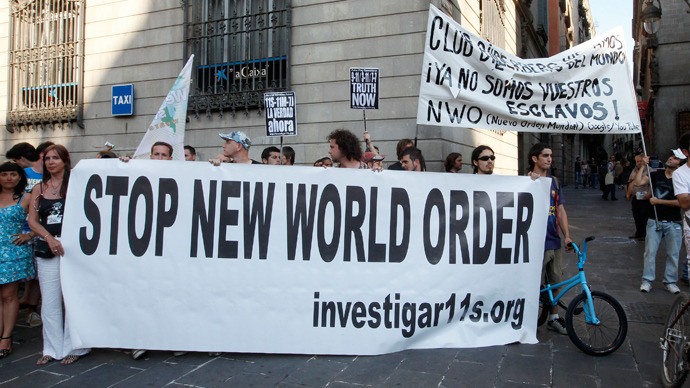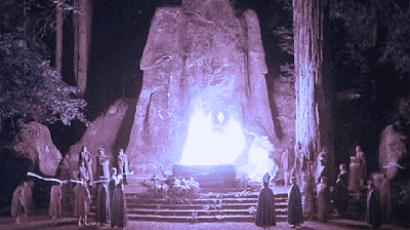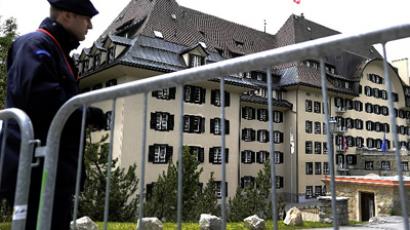Bilderberg 2013: Just your average charity case?

As approximately 140 members of the global elite prepare to meet in Watford, England, this week for the 61st Bilderberg meeting, British residents may be surprised to see who is forced to foot the bill for security.
This week, the global movers and shakers will check into the
5-star Grove Hotel outside London for four days of wining, dining
and - as the conspiracy theorists would have us believe -
comparing notes on how to control the world (June 6-9).
At the same time, thousands of passionate protesters from around
the world will gather outside the 300-acre premises, complete
with 18-hole golf course, causing traffic jams and general
mayhem. Dorothy Thornhill, the mayor of Watford, has raised fears
that the activities could also bring "violence."
“I have my concerns about it because it does attract people
who can and do cause violence and disturbance,” she told the
Watford Observer. “But I am confident the police will be able
to minimize that and give them their right to protest.”
It will be the British taxpayers, however, who will be forced to
pick up part of the tab for part of the security expenditures;
the global elite that will be in town will have its portion
covered by its specially designated status.
Hertfordshire Police said the Bilderberg Group has agreed to pay
some of the cost of security through the charity called the
Bilderberg Association.
Yes, you’ve heard right. The Bilderberg Group, who is suspected
by those with a more conspiratorial slant of mind as having
designs on global domination (enter sinister laugh, piano music),
is actually an officially registered charity case (# 272706).
“According to its Charity Commission accounts, the association
meets the ‘considerable costs’ of the conference when it is held
in the UK, which includes hospitality costs and the travel costs
of some delegates,” the Guardian reported.
And who pays into the Bilderberg charity fund? As the Guardian
reported, the charity receives regular “five-figure sums” from
two weighty supporters of its benevolent goals: Goldman Sachs and
BP.
Yes, those two cuddly corporate behemoths, which are practically
synonymous with well-worn clichés, like corporate malfeasance and
insane greed. The former was responsible for blowing a
devastating hole in the global economy by hawking a tricky
investment product known as a subprime mortgages; the latter was
responsible for the Gulf of Mexico oil spill, which entered the
history books as the largest such disaster ever.
Some may see a conflict of interest here, where two corporate
monsters are footing the bill for global politicians, CEOs, and
other luminaries to eat well and play golf while discussing ways
to “steer” the course of the global economy.
Not surprisingly, after years of meeting behind closed doors, the
Bilderberg Group seems prepared to meet the public halfway on the
question of transparency. This will also involve some added
expenditures to the final bill.
“This year there is a press zone, police liaison, portable
toilets, a snack van, a speakers' corner – all the ingredients
for a different Bilderberg,” the Guardian reported.
A "festival feel" has been promised, it continued.
Meanwhile, activists are planning to hold a ‘Bilderberg Fringe
Festival,’ which organizers say will be a peaceful weekend of
guest speakers, music and workshops nearby.
Public scrutiny of the 61st Bilderberg meeting promises to be at
an all-time high, while media in Britain seems more prepared to
report on the secretive event – even gently mock it.
It would be too easy to blame the uptick in Bilderberg paranoia
on internet chat rooms, where conspiracy theories are minted
faster than wooden nickels. After all, in our hyper-connected age
of social media, the best way for a group to attract unwanted
attention is to boldly declare: “Elite Only, Democracy Need Not
Apply.”
Striving for transparency
Although members of the ‘Bilderberg Steering Group’ say their
closed-door meetings are merely “informal talk shops” where
participants can freely discuss pressing global issues, it seems
to be the unstated rule that participants do not speak publicly
about the event.
“Attendees are encouraged not to discuss the proceedings,
which fuels the secrecy concerns. Many adopt a ‘Fight Club’
approach to answering questions afterward,” The Washington
Post divulged following last year’s meeting. “In other words,
the first rule is, you do not talk about Bilderberg.”
This year, the Bilderberg Group (named after the Dutch hotel in
which it held its first conference in 1954), has invited a
handful of the planet’s most powerful to the luxurious Grove
Hotel, where attendees will be able to cavort with their peers
away from the glare of democratic oversight. This high level of
privacy has attracted a mixed bag of reactions.
“If a hundred of the world’s best-known sports figures or film
stars were gathered at some exclusive resort behind closed doors
for a private meeting, the entirety of the mass media would be on
hand, clamoring for admittance and demanding to know what was
going on,” commented James P. Tucker, the late investigative
journalist who was one of the first to throw a spotlight on the
Bilderberg meetings over two decades ago.
“When the world’s richest bankers, media barons,
industrialists, members of royalty and political leaders were
meeting secretly and discussing public policy matters that
impacted on the course of the world’s affairs, the establishment
press never said a word,” Tucker added.
Proponents of the meeting, however, say that collaboration among
individuals is possible to occur without the necessity of an
exclusive event.
“The idea that the so-called global elite need to have a
special retreat in order to hatch sinister plots that run counter
to the needs of the people is simply ridiculous,” a former
attendee of the event, who spoke on the condition of anonymity,
told RT.
While no official guest list for this year’s event has been
released, the annual gathering has previously welcomed
influential personalities including Henry Kissinger, David
Rockefeller, Tony Blair, the Prince of Wales, Bill Clinton,
Condoleezza Rice, not to mention, most surprisingly, a sprinkling
of editors of major newspapers.
Ironically, it has been the mainstream media’s deafening silence
of the prestigious event that has given Bilderberg most of its
largely-unwanted publicity. This year, organizers of the global
event hope to reverse that trend, aiming for much-needed
transparency and oversight.














